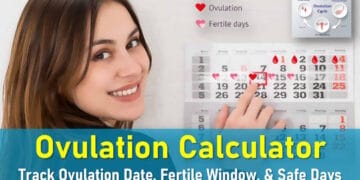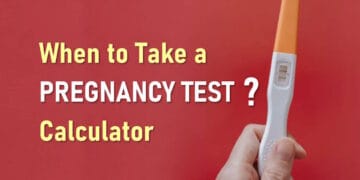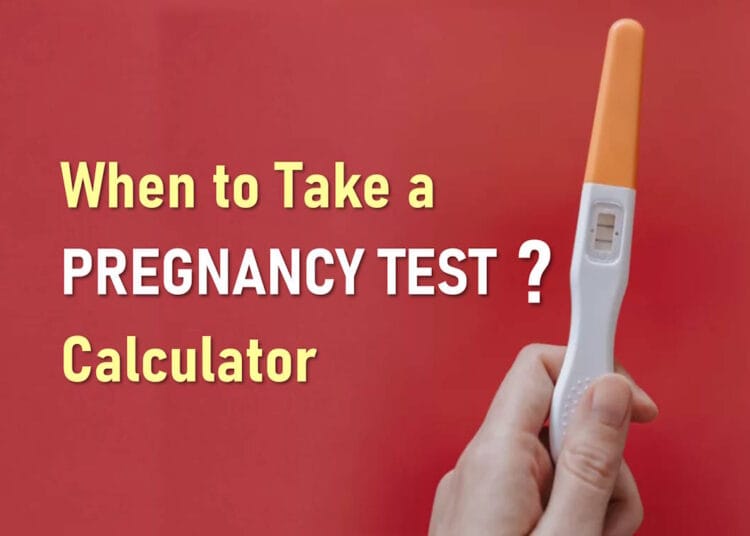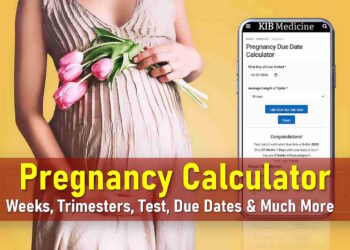When is the ideal time to take a pregnancy test? How soon can you test for pregnancy, and when will a positive result appear? If you’re trying to conceive, it’s natural to want answers as quickly as possible. Let’s explore the best and earliest timing for accurate pregnancy test results and how a pregnancy test calculator can help.
Related Calculators
How to Use the Pregnancy Test Calculator
This simple calculator is designed to help you determine the best time to take a pregnancy test. All you need is the following information:
- The date your last menstrual period started (the first day of bleeding).
- The average length of your menstrual cycle.
How Do Pregnancy Tests Work?
Pregnancy tests detect the presence of Human Chorionic Gonadotropin (hCG), a hormone that your body produces only after a fertilized egg implants in the uterus. Implantation typically occurs 6 to 12 days after ovulation. While blood tests can detect hCG as early as 2–3 days post-implantation, urine tests usually require a few more days.
The accuracy of pregnancy test results depends on the timing of implantation and the sensitivity of the test itself. Knowing these factors can help you plan the most reliable time to test.
When Should You Take a Pregnancy Test?
For the most accurate results, wait until after your missed period to take a pregnancy test. Most home tests are designed to detect hCG levels by that point. While some tests advertise results a few days earlier, testing too soon can lead to false negatives, where the test reads negative even if you’re pregnant.
Types of Pregnancy Tests
- Home Urine Tests: Over-the-counter tests that detect hCG in urine. These are typically reliable from the day of your missed period.
- Blood Tests: Conducted in a healthcare setting, these tests detect hCG in the blood and can identify pregnancy as early as 7–10 days post-ovulation.
Factors Affecting Pregnancy Test Results
- Day of Ovulation: If ovulation occurs later than expected, it can delay implantation and hCG production.
- Timing of Implantation: Implantation can happen anytime between 6 and 12 days post-ovulation, impacting hCG detectability.
- hCG Levels: Natural variations in hCG production can cause differences in when a positive result appears.
- Test Sensitivity: Some pregnancy tests are more sensitive and can detect lower levels of hCG. Check the sensitivity (measured in mIU/mL) on the packaging for early detection options.
Types of Home Pregnancy Tests
Home pregnancy tests come in two main types:
- Early Detection Tests: These are highly sensitive and can detect lower hCG levels, sometimes up to five days before a missed period. However, the accuracy is lower when testing early.
- Standard Pregnancy Tests: Designed to be used from the first day of a missed period, these tests provide more reliable results than early-detection tests.
Tips for Using an At-Home Pregnancy Test
Follow these tips to maximize the accuracy of your pregnancy test:
- Use your first-morning urine for higher concentrations of hCG.
- Avoid drinking excessive fluids before testing, as diluted urine can interfere with accuracy.
- Carefully follow the instructions provided with the test, including waiting the recommended time to read the results.
Earliest Time to Take a Pregnancy Test
If you track ovulation, you can plan to test as early as 9–11 days post-ovulation (DPO), roughly 4–5 days before your expected period. However, for more reliable early results, consider testing between 12–13 DPO, or 1–2 days before your expected period.
Optimal Time for Highest Accuracy
The best time to take a pregnancy test for the most accurate results is from 14–15 DPO, or from the first day of your missed period. At this stage, hCG levels are typically high enough to ensure a clear and reliable result, reducing the chances of false negatives or faint positives.
Understanding Pregnancy Test Results
Most tests display results through symbols, such as two lines, a cross, or the word “pregnant.” A faint positive line usually indicates early pregnancy with lower hCG levels. It’s a good idea to test again in a couple of days to confirm rising hCG levels.
Available Early-Detection Pregnancy Tests
Here is a list of popular home pregnancy test kits available in the USA, along with their features and accuracy levels:
First Response Early Result Pregnancy Test
- Earliest Use: 6 days before a missed period.
- Accuracy: 76% accurate at that time, with higher accuracy as the period date approaches.
Wondfo Pregnancy Test Strips
- Earliest Use: Recommended for use 1 day after a missed period, though some users report accuracy as early as 8–10 days post-ovulation.
- Accuracy: Best accuracy is achieved 1 day after a missed period.
Accu-Clear Early Pregnancy Test
- Earliest Use: Suggested for use on the day of the missed period for optimal results.
- Accuracy: 99% accurate when used on the expected period date.
e.p.t Certainty Pregnancy Test
- Earliest Use: Recommended for use on the day of the missed period for maximum accuracy.
- Accuracy: 99% accurate when used as directed.
Each test varies in sensitivity and the timing for optimal use, so carefully follow the instructions provided with the product for the best results.
Frequently Asked Questions (FAQs)
How early can I take a pregnancy test?
With early-detection tests, you can test as soon as 5 days before your expected period. However, the most reliable results are obtained on the day of a missed period.
Why are Pregnancy Test Calculators Based on LMP?
A pregnancy test calculator helps estimate the best time to take a test using your Last Menstrual Period (LMP) and average cycle length. For irregular periods, these calculators account for variability, though individual results may still differ.
Can I take a pregnancy test before my missed period?
Yes, but early tests are less accurate. Most tests are more reliable from the first day of a missed period. Early results may lead to false negatives due to low hCG levels.
Why did I get a negative test result even though I’m pregnant?
Testing too early is a common reason for false negatives, as hCG levels may not yet be detectable. Testing later in the day or after drinking excessive fluids can also dilute urine, affecting results. Retesting after a few days is advised.
What factors can delay a positive pregnancy test?
Delayed ovulation, later implantation, low hCG levels, and test sensitivity can all affect when a test shows a positive result.
How do irregular periods affect pregnancy test timing?
Irregular cycles make it harder to determine the best time for testing. A pregnancy test calculator based on ovulation and average cycle length can help, but waiting until your longest expected cycle length passes is often the safest approach.
Are early-detection pregnancy tests accurate?
Early-detection tests can be accurate but are less reliable before a missed period. Accuracy improves as you get closer to your expected period date. Waiting a few extra days can reduce false negatives.
Can certain medications affect my pregnancy test results?
Most medications, such as antibiotics or birth control, do not impact pregnancy test results. However, medications containing hCG, used in fertility treatments, can result in a false positive.
When is the best time to take a pregnancy test?
The most accurate time to take a pregnancy test is on the day your period is expected. Testing earlier may result in false negatives due to low hCG levels.
How soon can I take a pregnancy test after IVF or ICSI?
After IVF or ICSI, a blood test scheduled by your clinic is the most reliable option. Home tests may detect hCG about a week after embryo transfer, but consult your doctor to avoid false positives caused by IVF medications.
How soon will a pregnancy test show a positive result?
For natural conception, most tests show positive results around 14 days after ovulation. For IVF pregnancies, hCG may be detectable slightly earlier, but waiting for a clinical blood test is recommended.
How accurate are home pregnancy tests?
Most home pregnancy tests claim 99% accuracy on the day of the expected period. Testing too early or after fertility treatments may lower accuracy.
Will an ectopic pregnancy show up on a pregnancy test?
Yes, an ectopic pregnancy does produce hCG, which means it can result in a positive pregnancy test. However, an ectopic pregnancy is a serious condition that requires immediate medical attention, including ultrasound evaluation and careful monitoring of Beta hCG levels

































